Written by Jenn Hand, Holistic Nutritionist, Board Certified Health Coach, NBC-HWC
Are You Recovering from Binge Eating?
More than 2.8 million people in the US suffer from binge eating.
If you do binge, you are most definitely not alone. One of the most challenging parts of a binge is knowing what to do right after. Below are some helpful tips for recovering from binge eating and how to feel better mentally and emotionally!
I know exactly how it feels because I’ve been there and recovered.
It’s absolutely possible to recover from binge eating. It doesn’t have to be something that sticks with you for the rest of your life.
So let’s get into it! (+)
Table of Contents
- How Long Does It Take to Recover From a Food Binge?
- What’s the Best Thing to Do After Binge Eating?
- How Do You Mentally Recover from a Binge?
- Here Are a Few Other Steps to Help in Recovering from Binge Eating
- Recovering from Binge Eating in the Days Following – Tips to Remember
How long does it take to recover from a food binge?
Many variables factor into recovering from a binge, but a general estimate is that it’ll take 1-3 days to feel back in balance.
If this is a lone binge–meaning you haven’t overeaten in a while, and it’s not frequent–it may take you less time to recover.
If it’s part of a more regular occurrence, it may take a bit more time to feel more in balance and that’s okay!
Use the steps below to help you feel back in control.
What’s the best thing to do after binge eating?
The most important thing to do after a binge is to be extra kind to yourself.
Why is this so important? Because more often that not, it’s when beat ourselves up and hate-ourselves-into-change that can send us deeper into feeling out of control.
The thing we need most is forgiveness and kindness.
Forgive yourself for using food and know that we do so for a reason–we turn to food when we don’t know how else to deal with emotions. When we’re kind and compassionate towards ourselves post-binge, it helps us heal and recover more quickly to move on.
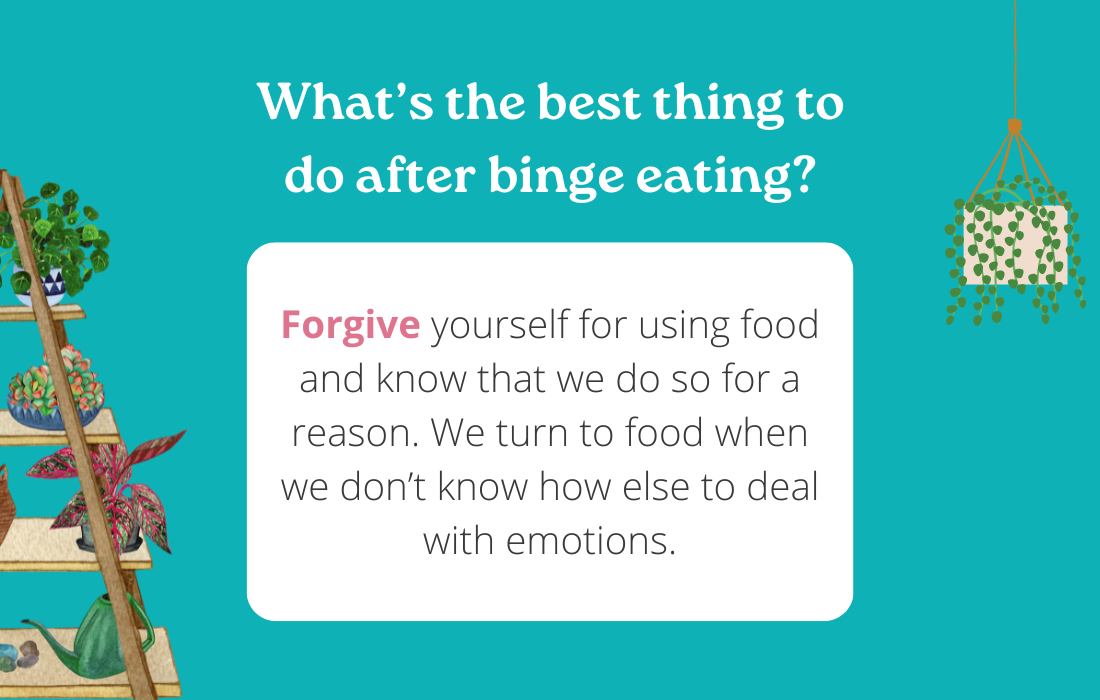
How do you mentally recover from a binge?
The mental recovery of a binge is a big part of healing. The self-hate, criticism, and self-loathing we feel are often what trigger a negative spiral and more eating.
Know that you are not a “failure.” I like to think of this path as a wide, winding path. It’s not a tightrope, and you are not obligated to stay on that tightrope (with strict rules, willpower and discipline).
There are no failures, only lessons to be learned.
When we carry around the guilt, the shame, and the feeling of being a failure only makes us feel more awful about ourselves and never gets us where we want to go: feeling balanced and at ease in our bodies.
A few mantras to keep in mind to help you recover mentally:
- Pretty good is perfect (no need to aim for perfection)
- There is no failure, only feedback (be open to the lessons)
- Worth over weight (see if you can let go of the scale to avoid judging yourself over your weight)
- One day at a time (to allow yourself to stay in today and not feel pressure to “fix” your issue for the next 20 years)
Related Post: 3 Things Never to Say to Yourself Around Food >>
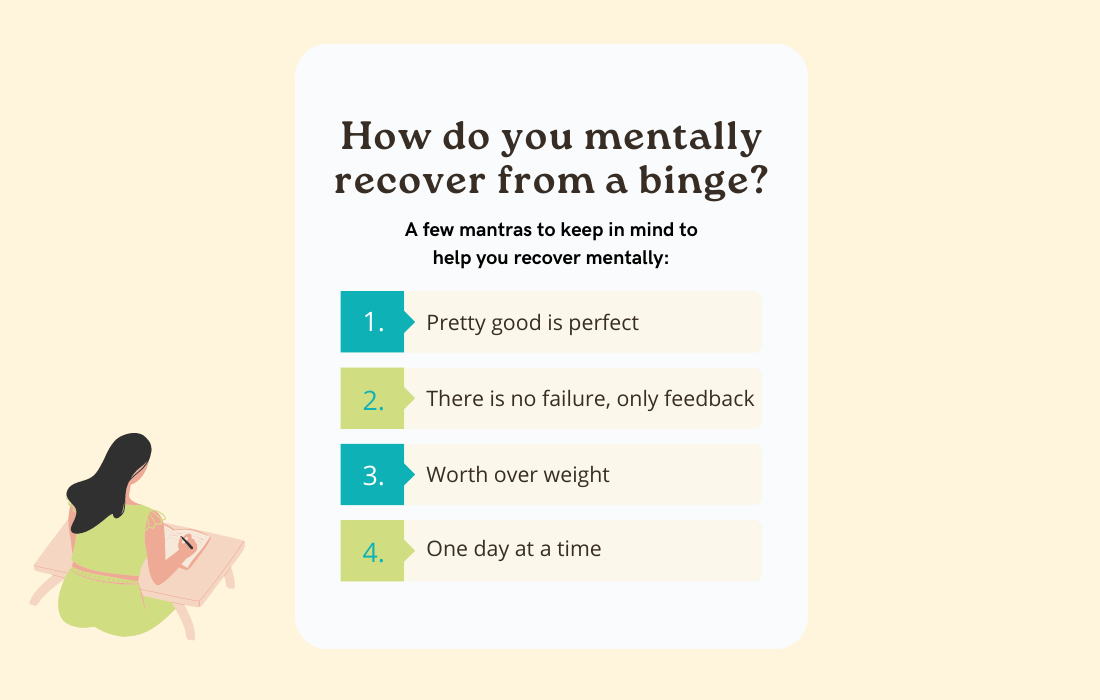
Here are a few other steps to help in recovering from binge eating:
1. Grab your journal
Write out your feelings in a journal to explore what caused the binge.
Usually, we don’t eat 6 bowls of ice cream just because it tastes good. We use food to escape, to numb out, to not have to deal with the challenging things in life.
Studies show that over 75% of overeating is caused by our emotions. (+)
So take a look at what triggers, stress, or emotions sent you to the food. That’s key in working to prevent another binge from happening.

2. Practice kindness
This is the most important piece post binge!
Our default is to move immediately into self-hate and criticism. “You’re such a failure. You know better. How could you have done that again?!”
See if you can adopt a curious mindset to look more deeply at what was going on in your life that caused a binge. This curiosity automatically moves you more into kindness and compassion.
It’s hard to be curious when we are critical, so that’s an easy way to shift from criticism into kindness!
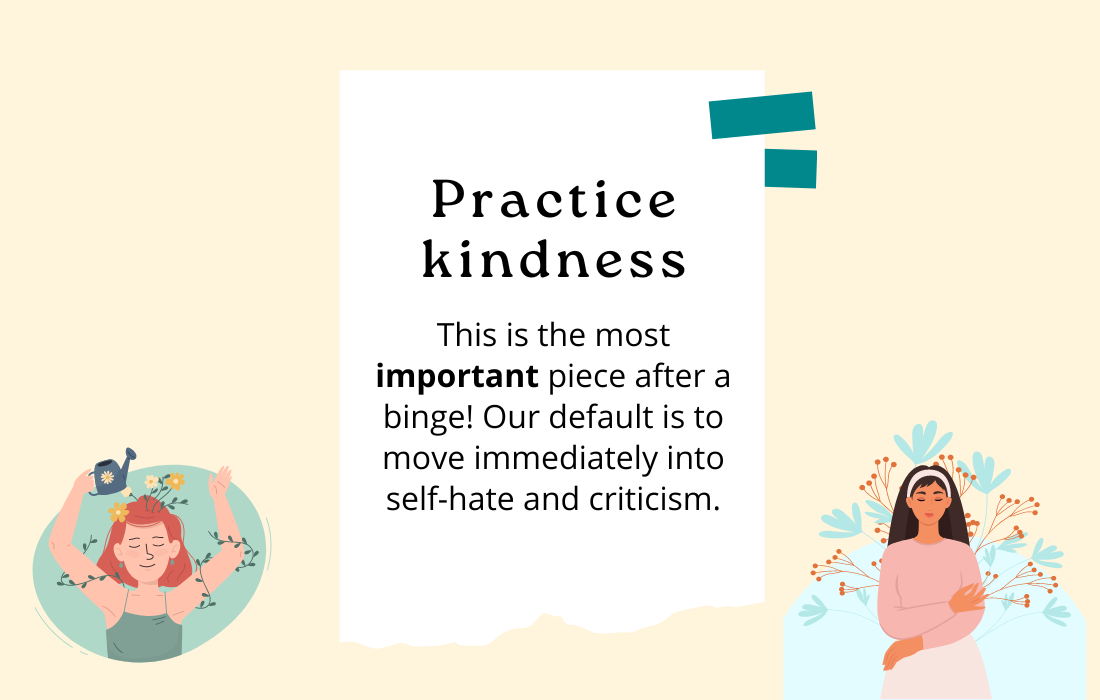
3. Explore what you most need
What is it that would help you most in the hours after a binge?
Maybe you need comfort and love (and that prompts you to express that to a friend or call a family member for a shoulder to lean on).
Or you might need to cry and release (journaling is good for this).
You may want to do something that lifts your spirits, like snuggling with a pet, getting outside, or taking in some sunshine. Whatever you most need to nourish and forgive yourself, experiment with finding something to help.
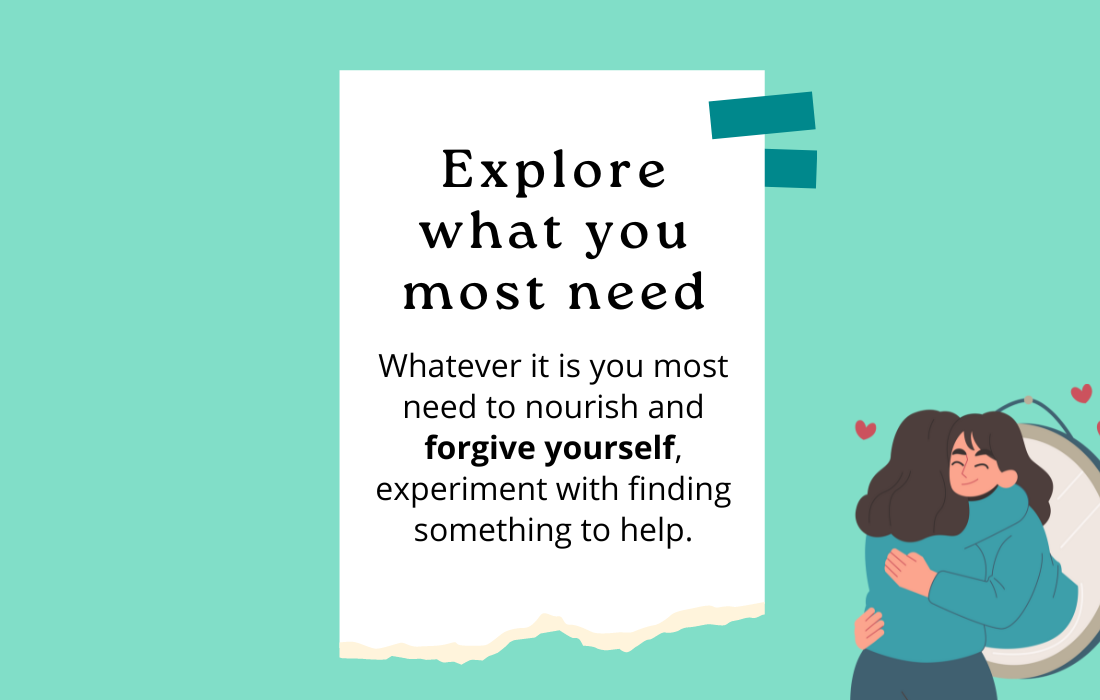
Recovering from binge eating in the days following, here are some tips to remember:
1. Drink water
This can be helpful from a purely physiological perspective. Water helps flush out anything our bodies don’t need.
So grab a water bottle and see if you can remember to drink some extra H20!
You can also experiment with herbal tea–that can help you stay hydrated and feel soothing to the soul 🙂
2. Eat in a way that feels nourishing
I’ve experimented over the years with this, as you can eat lighter and more nourishing foods without it being “diet-y.”
What would help your body feel better and more energized? How can you eat in a way that helps your body feel lighter?
Maybe you’re drawn to soups and salads. Or you’re aiming to cook at home instead of eating out. Or perhaps you want to add in fruit after each meal. Look at your day and see where you can gently plan some nourishing foods to help you feel balanced.
When doing this, we’re aiming for nourishment over restriction.
We don’t want to get stuck in the binge-and-restrict cycle.
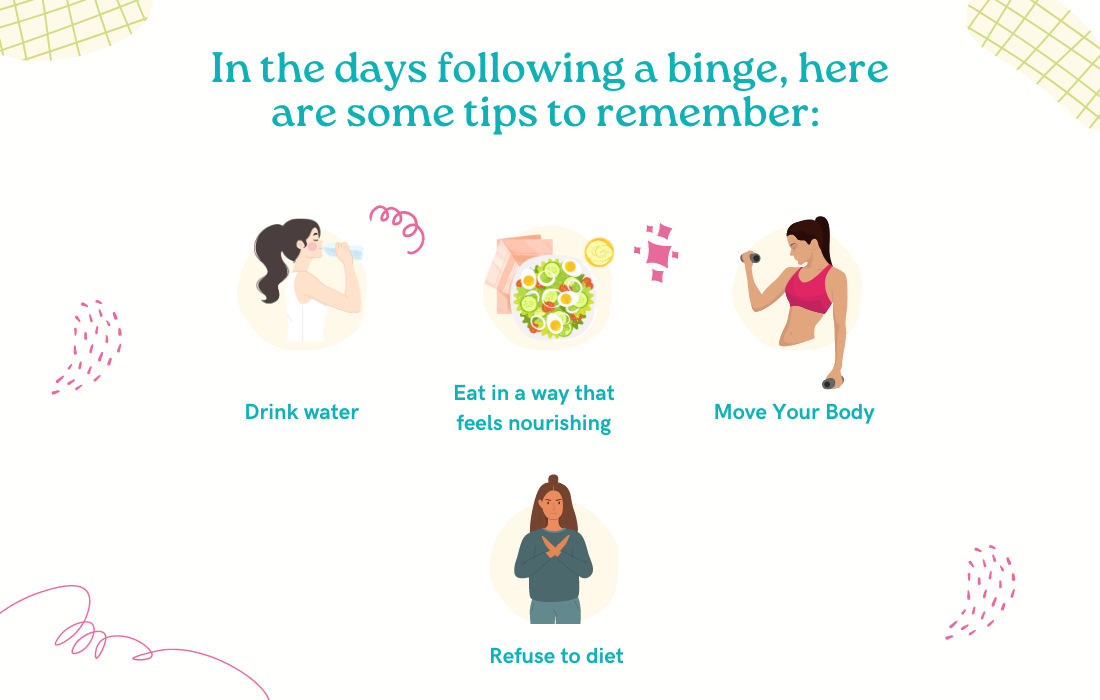
3. Move Your Body
One of the things I used to feel post-binge was this heavy lethargy. I didn’t want to leave my room, I wanted to isolate myself, and I felt sluggish.
To counteract this, the best thing you can do is to move your body—even if it takes a little bit of nudging.
Go out for a long meander in nature.
Grab a walking buddy.
Go to a dance class or fun class at the gym.
This isn’t an “I’m punishing myself” type of movement. It’s a way to let your body move and release.
This may feel uncomfortable, so pick something that feels low-key. Walking was always my choice, as it helped me clear my head and get outside.
4. Refuse to diet.
Hands down the hardest thing to NOT do post binge is diet.
It’s our default reaction: we want to try to ‘get back to’ what we were eating before. But when we fall back into that old pattern of “starting over”, we inevitably fall off the wagon again and overeat or binge.
Diets give us the illusion of being in control and that feels “safe” in our despair after a binge. We feel drawn to that illusion of a fix.
Do whatever you can to avoid starting another diet!
It can be helpful to remind yourself of past dieting history (and in my experience, the longer we go in the diet world, the fewer days we end up sticking with a diet. I think it’s our soul rebellion. 🙂 If we can resist the temptation, it means that since we don’t “start” something, we don’t “fall off” something!
Want to halt a binge in its tracks?
Grab the FREE Guide: 4 Simple Ways to Stop a Binge!
More Articles About Overcoming Binge Eating
⚪ How to Get Off the Diet Roller Coaster
⚪ I Stopped Binge Eating, Here’s How I Did It
⚪ If You’re Not Dieting, How Will You Lose Weight?
⚪ How to Stop Bingeing at Night
Get the Normal Eater’s Newsletter
Join 8000+ women who are overcoming overeating, binge eating, and breaking up with dieting forever. Get Jenn’s inspiring and actionable weekly newsletter with the latest posts, podcasts, and tips on how to love your body, find food freedom, and lose weight holistically.
Get the Normal Eater’s Newsletter
Work with an Emotional Eating & Holistic Nutrition Coach
Overcome Bingeing and Emotional Eating, and Break Up with Yo-yo Dieting
Working with an emotional eating coach and holistic nutritionist can help you get free from the frustrating binge and restrict cycle and stop yo-yo dieting.
You don’t have to be obsessed with food or have a million rules around eating to find your natural weight and learn to love your body. Ready to actually see a lasting change and experience true freedom?
Click here to schedule a 20-minute introductory coaching call.
About the Author
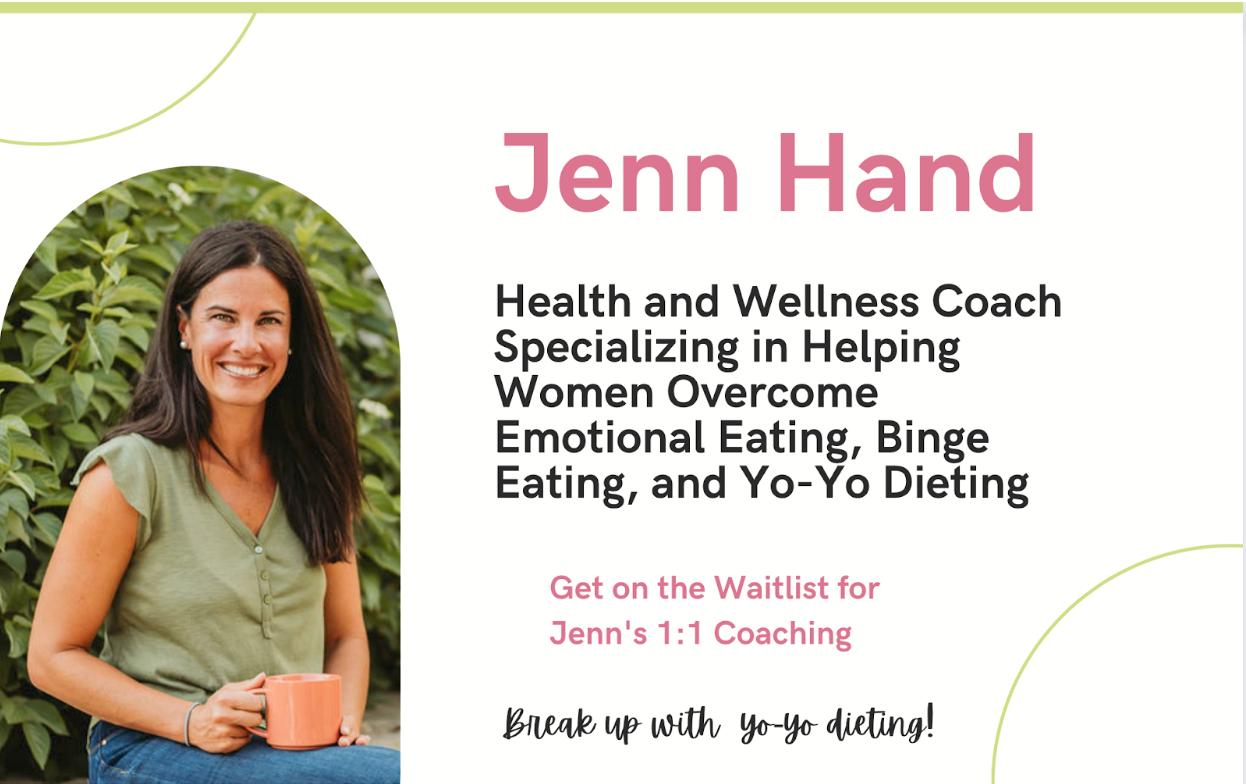
Jenn Hand has been helping women like you become normal eaters since 2015.
She’s worked with thousands of women, helping them to balance their bodies, end bingeing, stop obsessing over food, and start feeling amazing again. As a board-certified health coach and holistic nutritionist, Jenn knows how to support you in making real positive changes that last.
Her articles have been published on Mind Body Green, Tiny Buddha, Thrive Global and other local and global media platforms. She’s the author of How to Be a Normal Eater and the creator of The Normal Eater’s Club program. Listen to Jenn’s advice and tips on the Cake Doesn’t Count Podcast, or read more of her articles for free on the Food Freedom Blog.
Learn About Coaching!
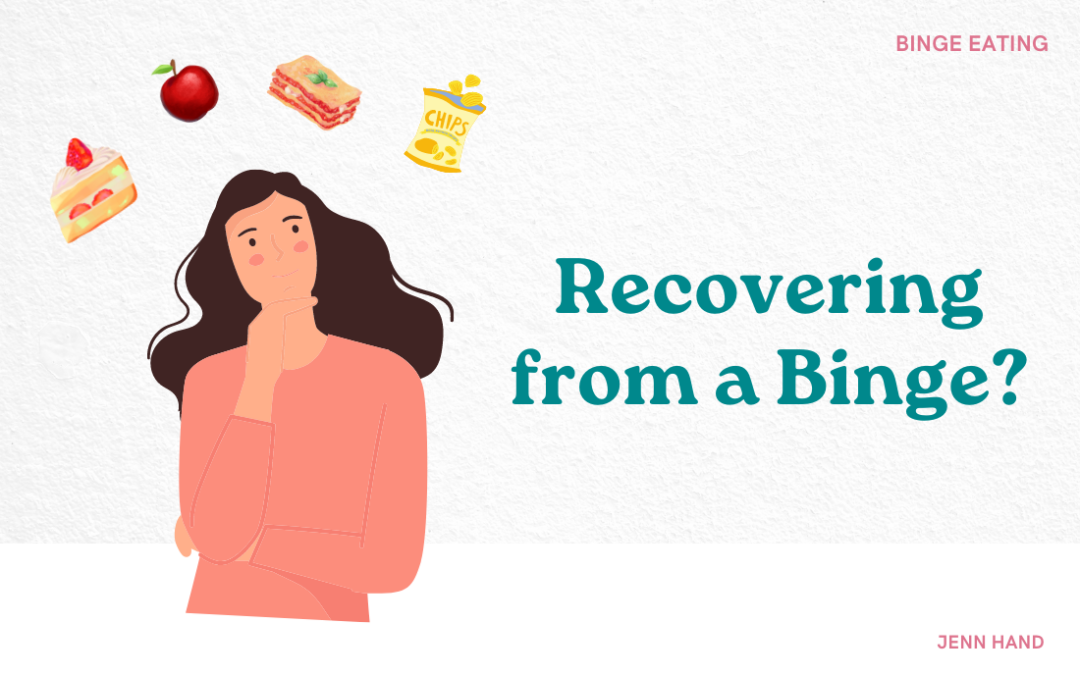




Thanks, Jenn! Very helpful and encouraging info!! 🙂
You’re most welcome 🙂